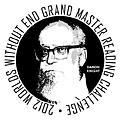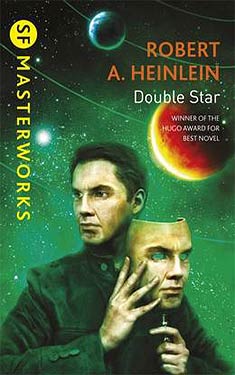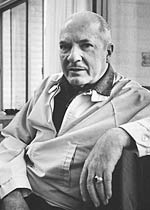GMRC Review: Double Star by Robert A. Heinlein
 Guest Blogger, Allie McCarn, reviews science fiction and fantasy books on her blog Tethyan Books. She has contributed many great book reviews to WWEnd and has generously volunteered to write some periodic reviews for our blog.
Guest Blogger, Allie McCarn, reviews science fiction and fantasy books on her blog Tethyan Books. She has contributed many great book reviews to WWEnd and has generously volunteered to write some periodic reviews for our blog.
 Double Star by Robert A. Heinlein
Double Star by Robert A. Heinlein
Published: Astounding Science Fiction (Analog), 1956
Awards Won: Hugo Award, 1956
The Book:
“One minute, down and out actor Lorenzo Smythe was – as usual – in a bar, drinking away his troubles as he watched his career go down the tubes. Then a space pilot bought him a drink, and the next thing Smythe knew, he was shanghaied to Mars.
Suddenly he found himself agreeing to the most difficult role of his career: impersonating an important politician who had been kidnapped. Peace with the Martians was at stake – failure to pull off the act could result in interplanetary war. And Smythe’s own life was on the line – for if he wasn’t assassinated, there was always the possibility that he might be trapped in his new role forever!” ~WWend.com
I’ve read a fair amount of Heinlein (The Moon is a Harsh Mistress, Starship Troopers, Stranger in a Strange Land, and various short stories), and I enjoyed Double Star. It seemed much lighter and action-focused than other Heinlein novels I’ve read so far.
My Thoughts:
Double Star is a pretty short, fast-paced novel, with a kind of light, not-too-terribly-serious tone that made it a lot of fun to read. I don’t think that Double Star is really comedic sci-fi, but it just has an enthusiastic, good-natured attitude that really makes it easy to get caught up in the story. The novel focuses on the actor Lorenzo Smythe, the highly skilled—and incredibly conceited—man who gets caught up in the great impersonation. At first, I thought I would find his narration irritating, since he spends an awful lot of time thinking very highly of himself, or alluding to great works of theatre. However, his whole character seems to be treated with a certain amount of humor. Rather than making me roll my eyes, his pomposity seemed to invite laughter. I also really enjoyed the way his character develops throughout the story.
While I thought Smythe was a surprisingly fun lead, not many of the other characters in the story are very thoroughly fleshed out. One of the most memorable was the politician’s secretary, Penny. Penny is the only female in the story, and she’s portrayed as emotional, childish, petulant, and almost entirely motivated by her crush on her employer. Her colleagues treat her with a kind of friendly condescension, once even playfully threatening to spank her if she didn’t behave. This was a little irritating to read, but it didn’t bother me as much as some other 1950’s portrayals of women. For one thing, Penny’s work is actually valuable to her political team, and Smythe’s impersonation would have likely been doomed from the start without her help. For another thing, I have to admit that many of the characters in the story are shown to be more than a little ridiculous. In this light, Penny seemed silly, as other characters were silly, rather than offensive.
 The story was exciting and quickly paced, and I felt that it built tension well. There were some very tense occasions where a failure on Smythe’s part could have been disastrous or even fatal. I appreciated that Heinlein did not derail the tension with lengthy political discussion, even though the story was about politicians. The politician Smythe impersonates, John Joseph Bonforte, has a strong presence in the story despite his physical absence, and it is through Smythe’s studies of his role that we are shown some of his views. The main message one could take from this story would be against racism. This being science fiction, Heinlein did use Martians and other aliens as the “other”, but racism is an issue involved both in Smythe’s personal life and in Bonforte’s politics. Given its temporal proximity to the Civil Right’s Movement, it seems like Double Star must have been particularly relevant to the political environment of the time period in which it was written.
The story was exciting and quickly paced, and I felt that it built tension well. There were some very tense occasions where a failure on Smythe’s part could have been disastrous or even fatal. I appreciated that Heinlein did not derail the tension with lengthy political discussion, even though the story was about politicians. The politician Smythe impersonates, John Joseph Bonforte, has a strong presence in the story despite his physical absence, and it is through Smythe’s studies of his role that we are shown some of his views. The main message one could take from this story would be against racism. This being science fiction, Heinlein did use Martians and other aliens as the “other”, but racism is an issue involved both in Smythe’s personal life and in Bonforte’s politics. Given its temporal proximity to the Civil Right’s Movement, it seems like Double Star must have been particularly relevant to the political environment of the time period in which it was written.
My Rating: 4/5
I think Double Star might be my favorite Heinlein novel to date. It seems to lean more towards the juvenile end of the Heinlein spectrum, but it still engages with some political issues that were likely especially relevant at the time of its publication. The story is ridiculous at times, but it is fast-paced and I found it very easy to get caught up in the excitement. Some character portrayals, such as the childish secretary Penny, are a bit tiresome, but they never seem mean-spirited. Like most novels, Double Star is a product of its time, but I think it still offers a fun experience for modern-day science fiction readers.



















 Full Details
Full Details


No comments yet.
Sorry, the comment form is closed at this time.